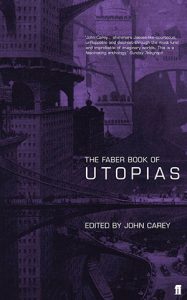The Faber Book of Utopias

Editor: John Carey
Publisher: Faber
Year of Publication: 2000
Print Length: 528 pages
Genre: Anthology, Non-Fiction / Essays
Topic: Imagination, Utopia, Cultural Heritage/Legacy, Culture & Society, Politics & Power, Creativity
An anthology of schemes, stories and ideas which people have dreamt of as Utopia. Provides a picture of the hopes and desires of the age in which each Utopia was conceived. The anthology encompasses many noble and selfless schemes but also reveals a trail of folly, tyranny and attempts at social control.
Every age has its utopias, from Plato’s “Republic” to contemporary sci-fi visions. In this spellbinding anthology, John Carey charts the course of every conceivable dream world – whether communist, fascist, anarchist, green, golden age, techno-fantastic or hermaphroditic – combining a broad historical sweep with lively variety. An experienced and imaginative anthologist, editor of The Faber Book of Reportage and The Faber Book of Science, Carey has gathered together a vast range of texts from Ancient Egypt to modern California, the authors of which, in different ways, attempt to describe a better world than our own.
Table of Contents
Introduction
1. Holy Snakes — Anon., The Tale of the Shipwrecked Sailor, c. 1940 BC
2. Golden Ages and Elysiums — Hesiod, Homer, Ovid c. 800 BC
3. Philosophers Rule — Plato, Republic, c. 360 BC
4. Pure Germans — Tacitus, Germania, AD 98
5. Spartan Conditions — Plutarch, Life of Lycurgus, c. AD 120
6. Arrangements in the Beyond — Irenareus, Lucian etc., second century AD
7. Watching the Damned Fry — Tertullian, De Spectaculis, c. AD 200
8. In a Chinese Mountain — Tao Qian, c. AD 400
9. More’s Conundrum — Sir Thomas More, Utopia, 1516
10. Moon Landing — Francis Godwin, The Man in the Moon, c. 1580
11. Utopian Cannibals — Michel de Montaigne, Essays, c. 1580
12. My America — John Donne, ‘To His Mistress Going to Bed’, c. 1595
13. Sun City — Tommaso Campanella, City of the Sun, 1602
14. The Island of Scientists — Francis Bacon, New Atlantis, 1627
15. Honours for Schoolteachers — Samuel Gott, Nova Solyma, 1648
16. The Earth Shall Be Made a Common Treasury — Gerrard Winstanley, c. 1650
17. On Not Being a Round Quadrangle — Thomas Hobbes, Leviathan, 1651
18. Holy and Cheerful — Andrew Marvell, ‘Bermudas’, c. 1653
19. Paradise Regained — Thomas Traherne, c. 1670
20. The Empress’s New Clothes — Margaret Cavendish, The Blazing World, 1666
21. Perfect Humans? — John Milton, Paradise Lost, 1667
22. Increase and Multiply — Henry Neville, The Isle of Pines, 1668
23. Reasonable Behaviour — Denis Vairasse, History of the Severambians, 1667-9
24. Unisex Australians — Gabriel de Foigny, A New Discovery, 1693
25. Alchemists Rule — Anon., The Sophick Constitution, 1700
26. Paradise Found — Ambrose Evans, Adventures of James Dubourdieu, 1719
27. Desert Island Discontent — Daniel Defoe, Robinson Crusoe, 1719
28. How to Discourage Adultery — Ambrose Philips, The Fortunate Shipwreck, 1720
29. Horse Sense — Jonathan Swift, Gulliver’s Travels, 1726
30. Wise Trees — Ludwig Holberg, Niels Klim’s Journey, 1741
40. Difficulties with a Flying Suit — Robert Paltock, Adventures of Peter Wilkins, 1751
41. The Happy Savage — Jean-Jacques Rosseau, Discourse on the Origins of Inequality, 1754
42. Utopian Fishing — Anon., Voyage to the Centre of the Earth, 1755
43. Eldorado — Voltaire, Candide, 1758
44. A Pastoral Idyll — Samuel Johnson, Rasselas, 1759
45. An American in London — Anon., Private Letters from an American, 1769
46. In the South Seas — Louis Antoine, Comte de Bougainville, Voyage round the world, 1772
47. Happy Taxpayers — Louis-Sebastien Mercier, The Year 2440, 1771
48. Mathematical Perfectibility — Antoine Nicolas de Condorcet, Sketch, 1794
49. Sanctuaries for Sadists — The Marquis de Sade, Justine, 1791; Philosophy in the Bedroom, 1795
50. Equality — François-Nöel Babeuf, Defence, 1797
51. The Punishment Fits the Crime — Anon., Libellus, 1798
52. The Paradise of Single Mothers — James Lawrence, The Empire of the Nairs, 1801
53. The Gospel of Industrialism — Claude-Henri de Saint-Simon, Works, 1802-19
54. How to Run a Cotton-Mill — Robert Owen, A New View of Society, 1813-16
55. Passions Set Free — Charles Fourier, Selected Texts, c. 1800-37
56. Head-Bumps and Destiny — John Trotter, Travels in Phrenologasto, 1829
57. Lotos-Eaters — Alfred, Lord Tennyson, 1832
58. Plastic-Wood Paradise — J. A. Etzler, A Paradise within the Reach of All Men, 1833
59. The Joys of Sameness — Etienne Cabet, Voyage to Icaria, 1839
60. The Water Cure — Henry J. Forrest, Dream of Reform, 1848
61. The Noble Savage — Charles Dickens, Househould Words, 1853
62. The Really Precious Things — John Ruskin, Moden Painters, 1856
63. A New Nation — Abraham Lincoln, Gettysburg Address, 1863
64. To a Nunnery — Gerald Manley Hopkins, ‘Heaven-Haven’, 1866
65. Almost Human — Edward Lear, ‘The Jumblies’, 1870
66. Vril, Father of Bovril — Edward Bulwer Lytton, The Coming Race, 1871
67. Sick Criminals — Samuel Butler, Erewhon, 1872
68. The Withering State — Karl Marx, Critique of the Gotha Programme, 1875
69. Good Deaths — Anthony Trollope, The Fixed Period, 1881-2
70. Women in Power — Walter Besant, The Revolt of Man, 1882
71. Green England — Richard Jefferies, After London, 1885
72. The Frustration of Smith — W. H. Hudson, A Crystal Age, 1887
73. Bring Back National Service — Edward Bellamy, Looking Backward, 1888
74. A Cure for Wrinkles — Elizabeth Burgoyne Corbett, New Amazonia, 1889
75. An Ideal Ireland — Edward Joseph Martyn, Morgante the Lesser, 1890
76. Socialism for Aesthetes — Oscar Wilde, The Soul of Man under Socialism, 1891
77. Going Nowhere — William Morris, News from Nowhere, 1891
78. Suicide on Tap —Ignatius Donnelly, Caesar’s Column, 1891
79. Utopian Menopause — Elizabeth Wolstenholme, Woman Free, 1893
80. The Law of the Jungle — Rudyard Kipling, The Jungle Book, 1894
81. Garden Cities — Ebenezer Howard, Tomorrow, 1898
82. Young Man Goes East — Joseph Conrad, Youth, 1898
83. Eliminating the Unfit — H. G. Wells, Anticipations, 1901
84. Progressing to the Higher Life — John Macmillan Brown, Limanora, 1903
85. Deep-Frozen Genius — Gabriel Tarde, Underground Man, 1905
86. Fish Heaven — Rupert Brooke, ‘Heaven’, 1913
87. Virgin Births — Charlotte Perkins Gilman, Herland, 1915
88. A Surgical Cure for Imagination — Yevgeny Zamyatin, We, 1920
89. Sailing to Byzantium — W. B. Yeats, A Vision, 1925
90. Samoan Fibs — Margaret Mead, Coming of Age in Samoa, 1929
91. Imaginary Etruscans — D. H. Lawrence, Etruscan Places, 1932
92. Shangri-La — James Hilton, Lost Horizon, 1933
93. Women in Cages — Katharine Burdekin, Swastika Night, 1937
94. Christ Takes Over — Newman Watts, The Man Who Did Not Sin, 1939
95. Hitler’s Russian Garden — Adolf Hitler, Mein Kampf, 1924; Table Talk, 1941-44
96. On Not Licking Your Lollipop — B. F. Skinner, Walden Two, 1948
97. The Worst Thing — George Orwell, Nineteen Eight-Four, 1949
98. Men or Machines? — Kurt Vonnegut, Player Piano, 1953
99. Huxley’s Hell and Heaven —Brave New World, 1932; The Doors of Perception, 1954; Island, 1962
100. Disneyland at Christmas — E. L. Doctorow, The Book of Daniel, 1971
101. Describing Venice — Italo Calvino, Invicible Cities, 1982
102. Space Potatoes — Freeman J. Dyson, J. D. Bernal Lecture, 1972
103. Infertile Solution — Naomi Mitchison, Solution Three, 1975
104. Mixed Motherhood — Marge Piercy, Woman on the Edge of Time, 1979
105. Having What You Want — Julian Barnes, A History of the World in 10 1/2 Chapters, 1989
106. The Lottery State — Barbara Goodwin, Justice by Lotter, 1992
107. What Women Want — Bernadette Vallely, What Women Want, 1996
108. Utopian Coursework — Jim Dator, Desirable Societies, 1996
109. The Intelligent Planet — Michio Kaku, Visions, 1998
110. Designer Children — Lee M. Silver, Remaking Eden, 1998
Acknowledgements
Index of Authors
Index
References
Index

John Carey is an Emeritus Professor at Oxford University. His books include studies of Donne, Dickens and Thackeray, The Intellectuals and the Masses, What Good Are the Arts? and A life of William Golding.
Source: https://www.nytimes.com/2023/08/21/books/howard-s-becker-dead.html
More from John Carey in this library, click here.
